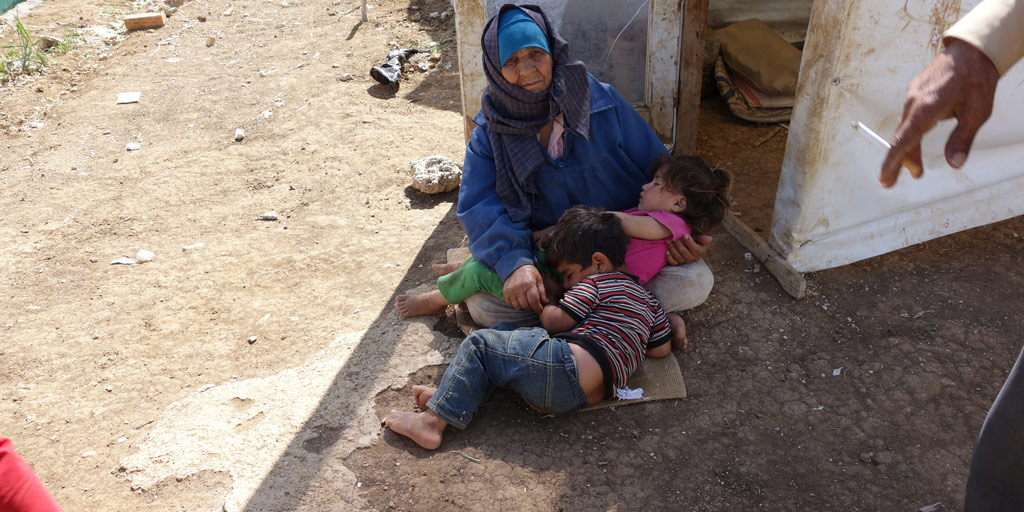Rumours of Grace: The Tale of the Good Asylum Seeker
 CREDIT: EUROPEAN COMMISSION DG ECHO ON FLICKR (CC BY-NC-ND 2.0)
CREDIT: EUROPEAN COMMISSION DG ECHO ON FLICKR (CC BY-NC-ND 2.0)A story in the Bible, The Parable of the Good Samaritan, is easily comparable to the story of refugees seeking asylum in Canada in the present day.
The CBC has posted a story about Winnipeg restaurant owner, Mohammed Naser. There are of course many restaurant owners in Winnipeg. But what sets Naser apart from many others is that he is a refugee from Syria, an asylum seeker, who is now committed to hiring other refugees.
His story reminds me of a story that Jesus told, The Parable of the Good Samaritan or as I am calling it today, The Tale of the Good Asylum Seeker.
In Jesus’ time, 2,000 years ago, devout Jewish folks looked down on people who lived in Samaria, an area in the middle of Israel (homeland of the Jewish people); most Jews regarded the area as religiously unclean. Some, if they were traveling between north and south Israel, would intentionally take a route around Samaria. The reason was because Samaritans were accused of fudging on key Jewish understandings, especially that they worshipped, not in Jerusalem, but on Mount Gerizim, which they do to this day.
At one time Jesus brought into one of his stories a Samaritan man. Jesus was having a discussion about the command to “love your neighbour as yourself”. You can read the account of this conversation easily by looking up Luke 10:25-37 online or in a printed Bible. You will see that the discussion quickly focused on the question, “Who is my neighbour?” But by the time Jesus finished telling the parable, or tale, of the Good Samaritan he changed the focus to the question, “What does it mean to be a neighbour?”
In the tale a man is travelling through Jewish, not Samaritan, country. Robbers attack him, steal from him and leave him for dead. Two religious leaders see him lying on the side of the road. They do not approach the injured man, perhaps thinking that he is dead. Their laws require that if they were to come into contact with a corpse that they would have to undergo a cleansing. That would have interrupted their religious duties such as making official prayers or teaching the laws of God.
Too busy being religious, they do not stop to help the dying.
However, an “unclean” Samaritan does help the man. He bandages his wounds, transports him on his donkey, pays for his lodging and pledges to take care of any additional costs.
Here’s the thing, the Samaritan travelling in Jewish territory is like a modern asylum seeker. He is without privilege; he is in a region that he cannot call home; he is looked down on by many and many seek to have him cast out.
And yet, while the “righteous” people of the region pass by the half-dead victim, this man who is looked down on helps the victim of the assault and robbery. He, not the righteous, conducted himself in the way God wanted him to. He, not the righteous, understood that the victim was his neighbour. He, not the righteous, understood what it means to be a neighbour.
Many of us have lived in Canada a long time. Indigenous readers have roots in this part of the globe that go back many centuries and many more of us are later arrivals.
Those who are well-established in Canada may see asylum seekers as a threat. They bring their fears, their poverty and their needy family members with them. Perhaps they will live on the edges of the law or commit crimes. It will always be easy to regard asylum seekers as potential threats.
But The Tale of the Good Asylum Seeker offers another way of seeing asylum seekers. It exposes us to God’s call to see in the asylum seeker not merely a threat to the orderly life of Canadians. Asylum seekers have the potential to care for those who are in trouble. It is not unusual to find stories in our media showing how refugees who have come to Canada are now assisting others. Naser’s story is one of those.
Asylum seekers can teach those who fear to reach out what it means to be a neighbour. We may find, in years to come, that well-established Canadians gave less to asylum seekers than we may think, and that they gave more than we expected.
Editorial opinions or comments expressed in this online edition of Interrobang newspaper reflect the views of the writer and are not those of the Interrobang or the Fanshawe Student Union. The Interrobang is published weekly by the Fanshawe Student Union at 1001 Fanshawe College Blvd., P.O. Box 7005, London, Ontario, N5Y 5R6 and distributed through the Fanshawe College community. Letters to the editor are welcome. All letters are subject to editing and should be emailed. All letters must be accompanied by contact information. Letters can also be submitted online by clicking here.














